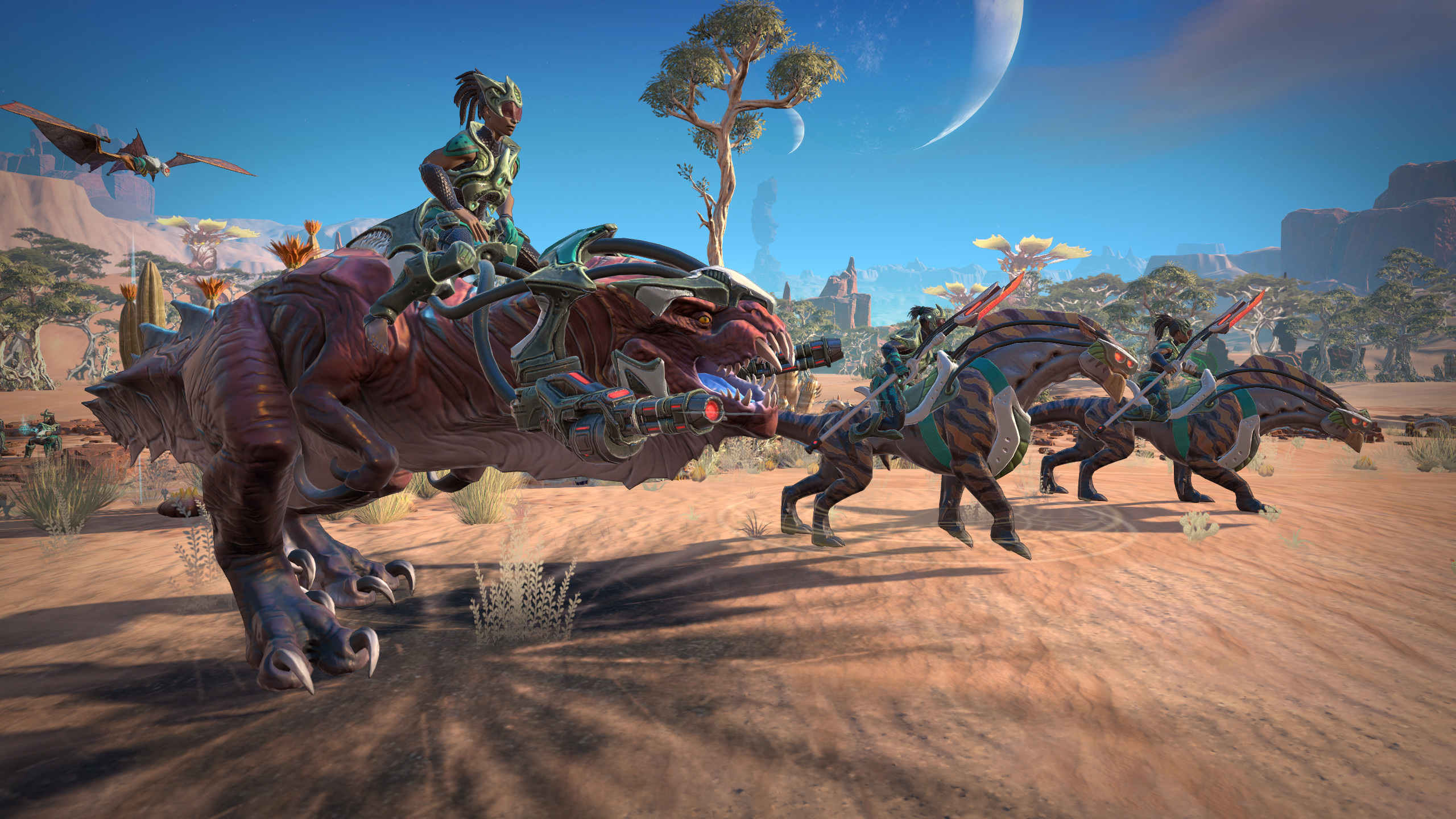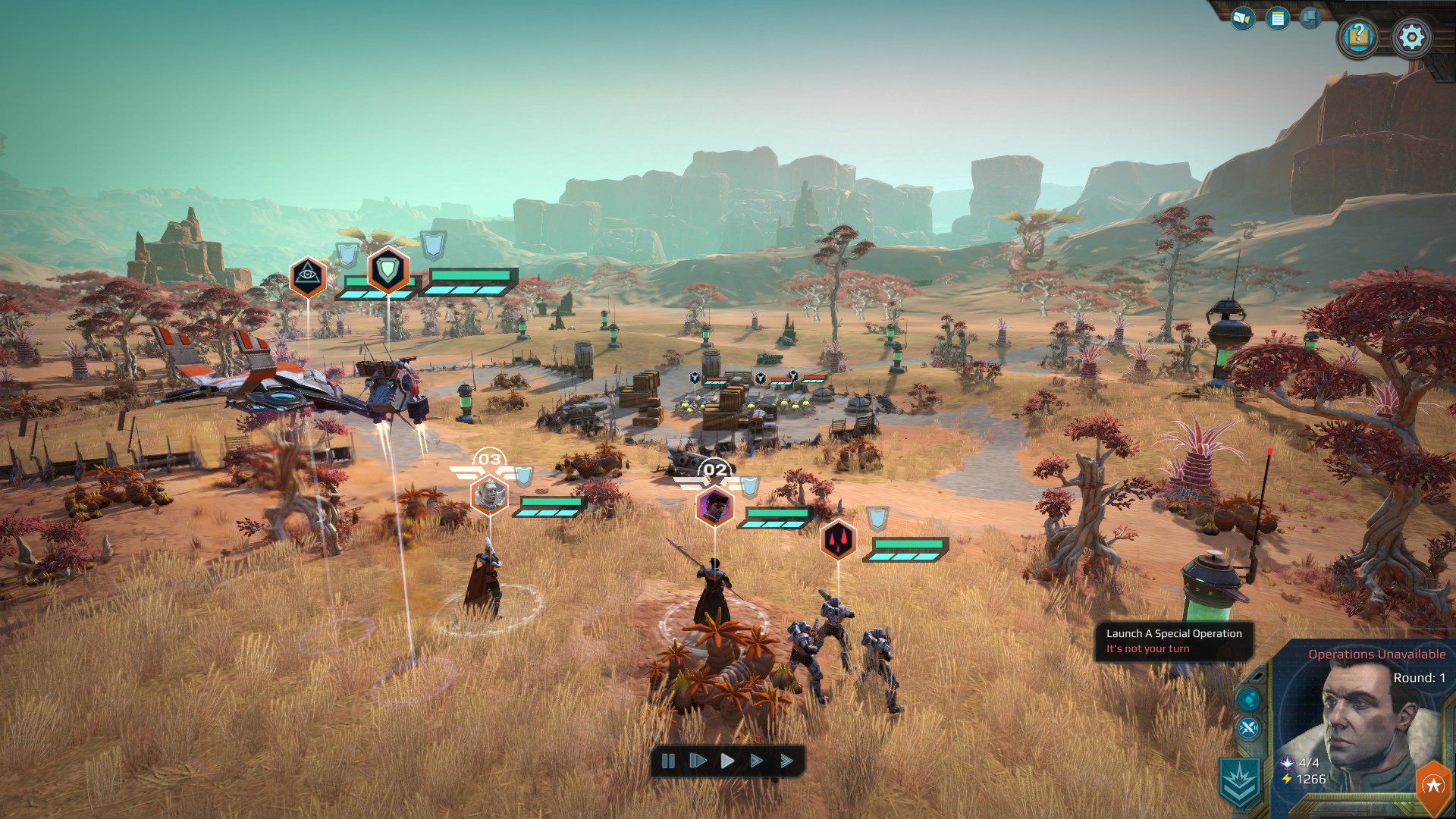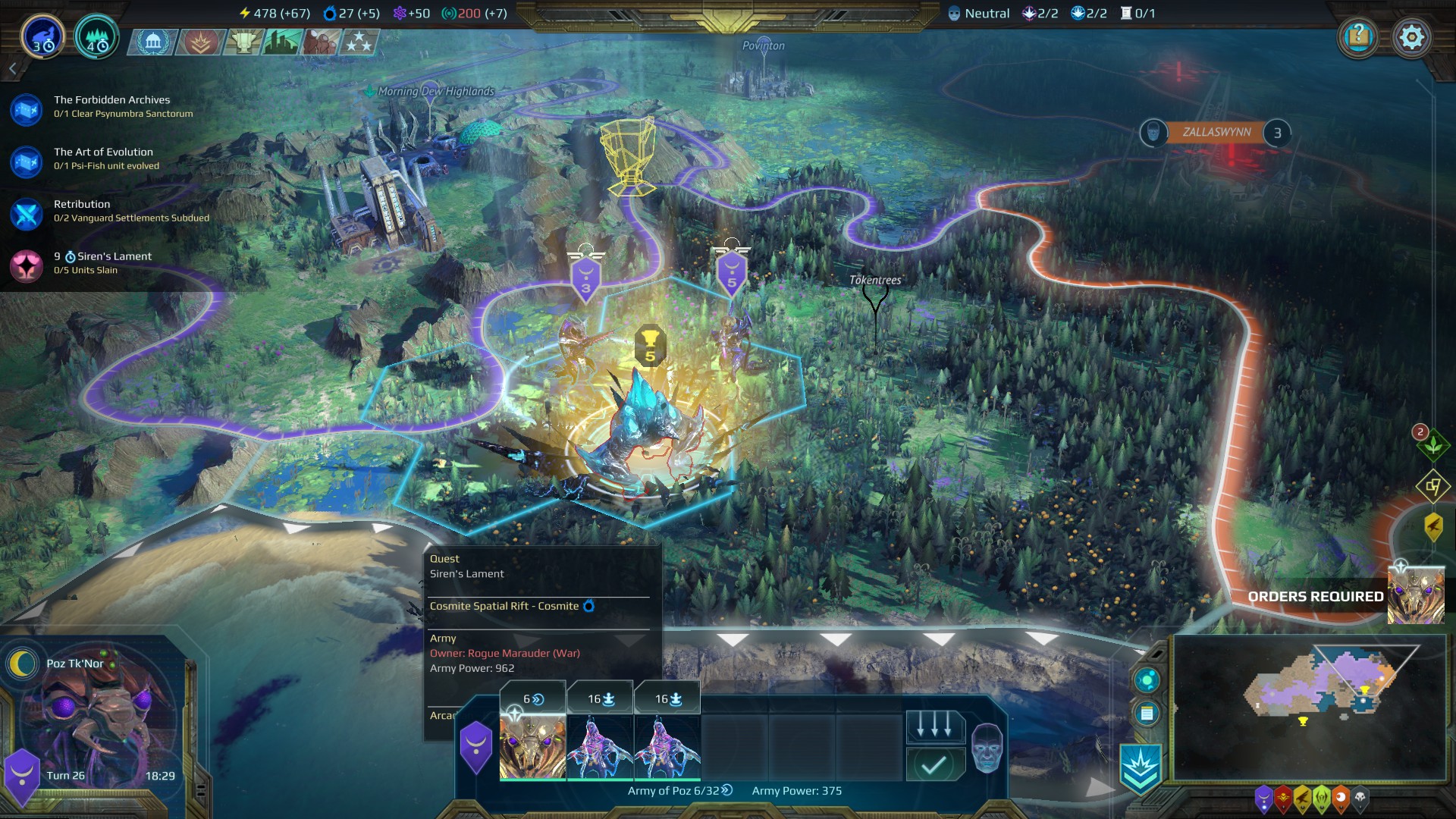Our Verdict
Age of Wonders: Planetfall, while a bit opaque in some areas, is the most entertaining 4X I've played in years.
PC Gamer's got your back
What is it? Turn-based planetary conquest 4X with tactical battles.
Expect to pay $50 / £45 for the base edition
Developer Triumph Studios
Publisher Paradox Interactive
Reviewed on Windows 10, Intel Core i7, 16GB RAM, Nvidia GTX 970
Multiplayer Online, local hotseat, and asynchronous PBEM
Link Official site
Revenge is a dish best served cold, the ancient Klingon saying goes, and nobody knows this better than penguins. Having made the interstellar journey to this dusty backwater planet alongside my rugged band of frontier fighters, the penguins quickly proved themselves admirable fighters in our war against the vicious psychic bugs who had showed up first. As my troopers fell prey to the insects' virulent battle vomit, the 10-foot penguins swooped in to tear the bugs apart with trisected beaks.
Age of Wonders: Planetfall is the long-running fantasy series' sci-fi spin-off; the Alpha Centauri to Age of Wonders' Civilization II. Fans of the series will find Planetfall immediately familiar, as it maintains Triumph's now well-established 'faster 4X' dynamics peppered with XCOM-style tactical battles. What Planetfall has that's new is a cast of delightful factions that range from hyperintelligent jellyfish to a species that constantly rebuilds itself from the flesh of its fallen enemies.
For newcomers to the Age of Wonders series, the bones of the games will be familiar from the Civilization series' vision of the 4X: arrive on the planet, establish a first city, research new technologies, explore and inhabit the surrounding areas, and build up a military force to deal with ambient threats and other players trying to do the same thing. Your ultimate goal is to either eliminate your competition or complete some world-altering achievement.
But put aside the hex-based world map momentarily, and you find that Age of Wonders—Planetfall included—shares as much with the classic Heroes of Might & Magic series as it does with Civilization. Here, your heroes and the armies they command are genuine characters who gain experience, learn new skills, and can bring increasingly lethal equipment to bear on the battlefield. These characters all belong to factions that have starkly different playstyles, but by building alliances and working with local peoples, it's possible to mix and match units and heroes from across Planetfall's wide menagerie. And because it's an Age of Wonders game, that includes battle penguins.
A whole new world
Planetfall's multi-thread story campaign serves as both narrative and mechanical introduction to the factions at play this time around. There's the Vanguard, a human faction that's recently emerged from two centuries in cryogenic sleep after the fall of the Star Union, which by most accounts was a brutal and corrupt hegemony that kept many non-human races in abject subjugation until its collapse. The Vanguard's laser-toting soldiers and helpful drones are the most vanilla and familiar of Planetfall's races. Over the course of the campaign you'll encounter and play as stranger and more exciting factions (all of which are available immediately in scenario mode).
While the Vanguard were fast asleep, other groups were finding their way through the wreckage left from the destruction of the Star Union. There are the Dvar, Planetfall's version of dwarfs, this time sporting gas masks and vaguely Russian accents. The Dvar prefer explosive weapons and mining equipment, and their midgame units can tunnel beneath the battlefield or plow through enemy ranks. Later in the game they can actually demolish mountain ranges on the strategic map.
The Kir'Ko are an insectoid race, perhaps the nerdier, more spiritual relatives of the bugs from Starship Troopers. They have the standard-issue hardened carapaces and slashing pincers of course, but they're also equipped with a range of psionic abilities that allow them to break enemies' willpower or bolster each other's defenses when they stick close together.
Keep up to date with the most important stories and the best deals, as picked by the PC Gamer team.
With each mission you'll also learn more about Planetfall's surprisingly deep setting. What at first seemed yet another stock-standard sci-fi pretext for dinosaurs with lasers on their heads quickly revealed a world I wanted to learn more about, and whose character backstories drew me forward through each subsequent mission. Planetfall flips the script on some long-standing sci-fi tropes in delightful ways. This time, for instance, the Kir'Ko 'bugs' are the victims of generations' worth of human oppression and enslavement, and we get to experience fighting off an infestation in the form of "sack bleeders" who they can't seem to be rid of no matter how far away they travel in the galaxy.
In addition to the playable species, you'll also encounter several NPC factions scattered across each map. These native peoples can be either befriended or antagonized depending on your goals for a particular game. They have their own relationships with each other and your competitors. While you can't opt to play as them, building trust will allow you to recruit their unique units, which can include floating jellyfish mind-flayers and the aforementioned war penguins. There's a splendid array of units available and, as in the old Heroes of Might & Magic games, you're free to recruit, mix, and match as you see fit, discovering new synergies and technologies along the way.
Faster, Battlecat! Kill! Kill!
More than any other individual element, what keeps Planetfall feeling fresh and fun is its relatively brisk pace. Settlements tend to grow quickly, armies zip around the map, and territory is conquered in chunks rather than as a function of gradually bulging borders. Each procedurally-generated world you land on in Planetfall has its own pre-defined geography of territories, and you'll take control of these deliberately rather than simply waiting as your population grows into them, per the Civilization model.
Each colony will attract citizens as you build improvements, and once you've reached a certain level, you can choose to annex a neighboring territory. You can still build colonizer units, but these can't be used in adjacent regions. Instead, you need to expand by picking resource-rich nearby areas, waltzing an army in and announcing you're the new lord. This keeps the map-filling early game pleasantly brief, and within a couple dozen turns you'll generally find that most areas have either been snapped up or at least been spoken for. Once this has happened it can take several turns for you to gain control of an enemy's territory, which can make diplomatic options much more appealing.
That increase in speed over the traditional 4X extends to most aspects of Planetfall. While you're free to fuss over each move in the tactical battles, you're can turn control over to the computer at any point, or have the AI adjudicate them altogether if the odds are wildly uneven or you aren't interested in that layer of the game. That would be a shame though, because Planetfall's tight tactics battles are a treat, and they quickly become much deeper than they first appear.
Each unit on Planetfall's hex-based strategic map is actually an army that can hold up to six units, which then duke it out on three-dimensional maps when the conversation goes south. When I first encountered these an Age of Wonders or two ago, I made the mistake of thinking they were a fun but simplified version of XCOM's tactics battles. I was delighted to learn I was wrong then, and Planetfall's broad array of units, weapons, and status effects means battles are even more varied this time around. The battle maps themselves are lovely to look at and as varied as the planetary terrain where they unfold. There are bombed-out highways, jungle temples, industrial parks, and snow-covered alpine landscapes. Some maps are littered with spiny black shards and dimensional rifts.
Perhaps you've leveled up a captain with perks like Ranged Expert and Deadeye, and given her a sniper rifle that shoots extra-dimensional void projectiles. You can perch her up on an embankment overlooking the gully where your Kir'Ko rivals are bound to flood in, while you send in troopers with laser rifles and set them to overwatch for when the bugs inevitably rush to melee range. Or perhaps you have a Dvar hero with the piloting and juggernaut perk: pop him into hulking excavator tank and tunnel underneath your foes while your Trencher line units pop up fortifications along the line. Every unit—penguins included—can be outfitted with custom modules that you can research or discover, and endlessly experimenting with different unit compositions and loadouts is a ton of fun.
Well, it's usually a lot of fun. There are a couple space flies in Planetfall's space ointment, and one of those is that information you need can be strangely difficult to find at first. Figuring out what various combat status effects actually mean in terms of gameplay can be puzzling, and the in-game Codex isn't always helpful. It can be annoying to figure out what to click in order to bring up key information about a territory you're considering annexing, and the research tree is initially opaque. It took me a few games before I had a firm notion of what I tech I wanted or needed, and those change for each faction. While the tutorials throw a lot of information at you at first, it's sparse in a few areas where Age of Wonders departs from the Civilization template.
My complaints, though, are minor. Age of Wonders: Planetfall offers not only a welcome change of scenery from the fantasy landscapes of its forebears, it manages to use its sci-fi setting imaginatively and meaningfully. With a fun story campaign and highly granular customization options for one-off scenarios, there's plenty here into which to sink your teeth—or chittering mandibles, as the case may be.
Age of Wonders: Planetfall, while a bit opaque in some areas, is the most entertaining 4X I've played in years.




